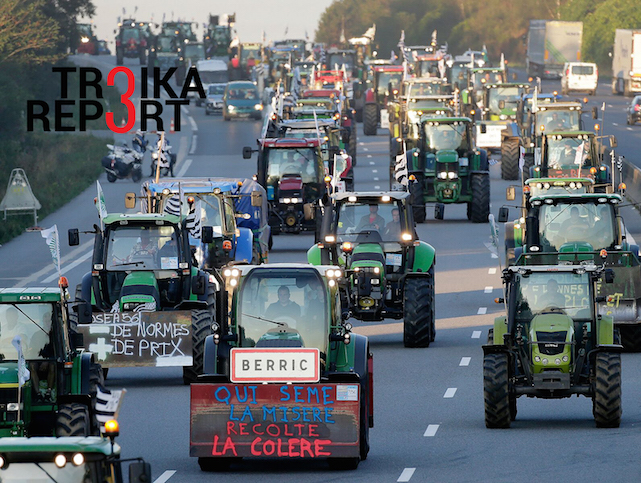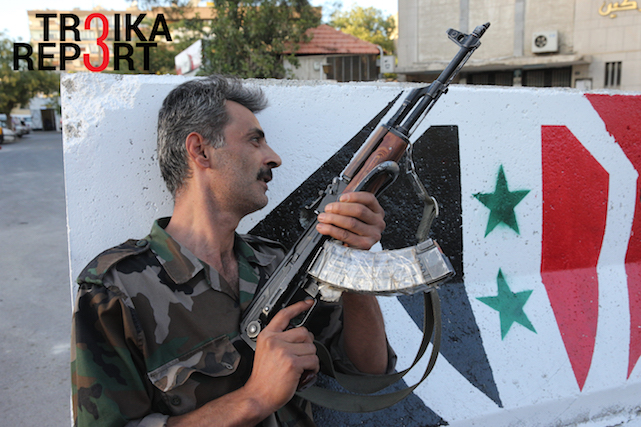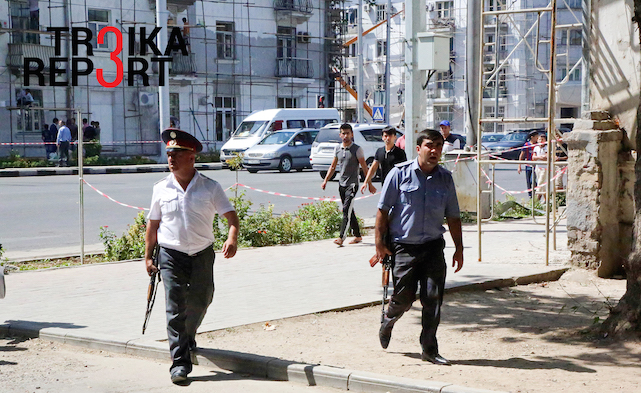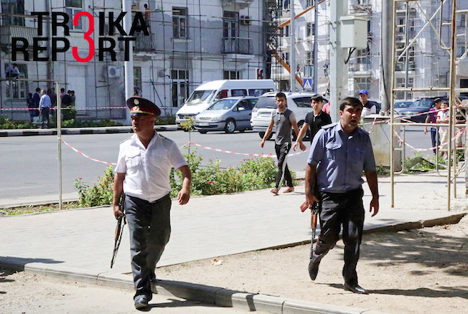1. Engaging the West
EU sanctions against Russia: a bitter harvest

French farmers from western France drive their tractors on the A10 motorway, outside Paris, September 3, 2015. Source: Reuters
Dark clouds hang over Europe’s agribusiness as it calculates the direct and collateral fallout from Moscow’s likely retaliation to the EU’s six-month extension of sanctions against Russia, intended to punish the Kremlin for what Brussels sees as its continuing failure to implement the peace agreements on the conflict in eastern Ukraine.
As the harvest season reaches its peak there has been a new wave of protests by income-starved European farmers. Amid mounting pressure, France in particular is considering abandoning the punitive embargo as a concession to local farmers distressed by nose-diving revenues and missed opportunities.
Overshadowed by the acute phase of the refugee crisis and the reemergence of Syria as a hot spot on global radars, the accumulating frustration of European exporters has gone almost unnoticed. Yet while this trend has been largely ignored by the media, this extra headache for export-oriented European companies, deprived of access to the vast Russian market, is a factor in its own right.
In fact, the street protests by French and Belgian farmers in Paris and Brussels in early September were mainly aimed at the EU’s overregulation policies. These guidelines offer the most favorable conditions to huge agricultural holdings, impose inflexible standardization norms, and favor mediocre producers rather than those who excel in their trade.
However, the frustration of the French farmers has also roots in the losses incurred as a result of the temporary closure of one of their lucrative markets, Russia.
Just for the record, the ban on pork exports to Russia is costing French farmers 100 million euros a year, but weighed against the depressed prices that have resulted from the ensuing oversupply, the actual losses are 400 million euros. Fruit and vegetable growers have lost some 50 million euros and dairy producers are looking at losses of 109 million euros.
“Sanctions against Russia are hitting some important sectors of the French domestic agriculture,” said French National Assembly lawmaker Nicolas Dhuicq.
In turn, Bertrand Venteau, former chairman of the French Rural Coordination, made the following statement: “Since Moscow closed its market to European farmers they are having to sell their products at a loss. Some of them have gone broke. There is a serious threat to the pork and apple markets in France.”
Will the frustration of the farmers be translated into a more vigorous political campaign to put an end to the sanctions and counter-sanctions that are hurting both sides? Kirill Koktysh, a political scientist and assistant professor at the Moscow State Institute of International Relations, told Troika Report that while the lobbying efforts of the European agricultural business should not be discounted, they should not be overestimated:
“European farmers, under the present circumstances, tend to be allies of Russia. First of all, they are protecting their markets because they are losing their income due to the counter-sanctions. Secondly, they are objecting to the proposed free trade agreement with the United States because it would kill their business. That is why the farmers are trying to influence the EU policy toward Russia.”
— Could the dissatisfaction of the farmers have an impact on EU policy?
“Naturally, they have become a factor of political life, but not an especially strong one. Will they be strong enough this year? It’s doubtful. It might just be one more step on the way to rethinking the European policy, with the chances being 50:50.”
So, with time, will the agricultural business become more proactive in engaging the authorities of the EU in the debate on the practicality of the sanctions? Pekka Vilyakainen, a Finnish millionaire who is currently advisor to the president of the Skolkovo Foundation in Moscow, has a more optimistic forecast, which he shared with Troika Report:
“I am absolutely sure that over time European business has been lobbying the EU over the sanctions. In fact, I would not call it ‘lobbying.’ ‘Making an impact’ would be a better word… The problem is that not enough people are interested in the situation. Right now Europe is talking about Syrian refugees, which is a massively big problem. Politicians have their focus somewhere else. And this is slowing down the process of getting the sanctions away.”
“All the European people would be extremely happy to drop the sanctions. I do not believe that there is any person in Europe, politician or ordinary person, who thinks it is right to have this situation frozen for a long period of time. It would benefit nobody.”
Meanwhile, the BBC noted that the street riots may have had a political impact, with French President Francois Hollande having made upbeat comments on the modest progress seen in the implementation of the Minsk peace agreements on Ukraine, in particular the ceasefire in the Donbass, and has expressed hopes “of seeing the end of sanctions against Russia.”
All things considered, the slogan of the day of the disgruntled farmers could be “Better farm than harm!”
2. Globally speaking
Syria: Will Moscow deploy ground troops to fight ISIS?

An armed soldier at a checkpoint on the outskirts of Damascus, the capital of Syria. Source: Mikhail Pochuyev/TASS
Intense speculations around the alleged build-up of Russian troops on the ground in Syria have now moved the issue of fighting the expansion of Islamic State (ISIS) to the top of the political agenda. In the coming weeks, various and conflicting methods of doing battle with the radical militant group will be reportedly discussed at the UN General Assembly and at the G20 summit in Antalya.
The divide between Russia and Iran on one side and the United States and its allies, namely, the Gulf monarchies, on the other, remains for the moment as acute as at the beginning of the civil war in Syria, now in its fourth year. The stumbling block is the disagreement on whether to unseat Assad’s regime or incorporate it into the collective efforts to defeat ISIS.
Moscow has pegged its strategy on convincing the U.S. and its allies that for the time being Assad and his army is the most effective means of fighting this formidable foe. The logic is that a wider anti-ISIS coalition, including Assad’s regime, would be instrumental for victory on the ground.
In order to facilitate the fight for the common cause, Russian diplomacy has engaged leading stakeholders. Apart from U.S. President Barack Obama, Moscow has conducted talks with the leaders of Turkey, Egypt, Jordan, and Saudi Arabia. According to Moscow sources, modest progress was recorded.
For example, there is more understanding among the interested parties that, as Russian President Vladimir Putin phrased it, “the fight against terrorism must go hand in hand with a political process in Syria.” The regime in Damascus seems to be trying to meet other regional actors half-way. Assad is ready to hold early parliamentary elections, engage the moderate opposition in dialogue and offer them government posts.
However, this may not be enough to kick-start the political process of a settlement because intensive fighting is still going on in the vicinity of the Syrian capital –cause to believe that Assad’s days are indeed numbered. Yet these are the very same hopes the opposition nurtured four years ago, and especially this spring.
The very possibility of Moscow upping the stakes and boosting its military involvement in the conflict in Syria is intriguing for everyone. Is this even likely?
Grigory Kosach, an expert on the politics of the Arab world and professor at The Russian State University for the Humanities, provided this comment for Troika Report:
“It is unrealistic to assume that Russia would immediately get involved in a confrontation with ISIS. In practical terms, I do not see how Russian military personnel now stationed in Syria could possibly come into combat contact with ISIS because they are separated by a vast buffer zone where different militant groups are fighting each other. How would they define the ISIS targets? Definitely, it would require a lot of preparatory work if the decision to get involved is taken at some point in time.
“It should be noted that at present, as many experts assert, Moscow is focused on creating a stronghold for Bashar al-Assad, that is, in Latakia and in the Alawite mountains around it where the Syrian president, in the worst-case scenario, would be able to find an adequate refuge.”
— What are the chances that the United States will adjust its rigid stance on the Syrian crisis, namely the fate of Bashar al-Assad?
“As for the position of the United States, it is not carved in stone. It is changing. After all, the U.S. has already conceded that it is essential to preserve government structures [in Syria], meaning the army and the security services. That is the result of the Americans accommodating the lesson they learned in Iraq, where government agencies were dismantled, paving the way for the emergence of ISIS.
“So, anything can happen, although I do not expect the U.S. to accept the preservation of Assad in any form, in particular due to the pressure applied by the Gulf States, led by Saudi Arabia, which put forward as an unconditional prerequisite the departure of the current Syrian president. Having said that, it is evident that even Saudi Arabia would not want all of the government institutions in Syria to crumble, since it would lead to even more chaos.”
The flurry of diplomatic talks and statements is a clear sign that something is in the making. The major actors are weighing up the possible solutions that would best serve their interests in the settlement of the two major crises: the Syrian civil war and the continuing expansion of ISIS, now the prime target on the world’s “most wanted” hit list.
3. Going Eastward
Instability in Tajikistan rouses concerns in Moscow

Police officers secure an area in the capital of Tajikistan, Dushanbe, where several Interior Ministry special forces officers and a traffic policeman were reportedly shot dead earlier on Friday, Sept. 4, 2015. Source: AP
Right after ambiguous reports of an aborted coup d’état in Tajikistan, Moscow has signaled the probability of fortifying the Central Asian nation’s borders with Afghanistan with Russian troops. Moscow’s statement coincided with a summit of the Russia-led six nation Collective Security Treaty Organization (CSTO) held in the Tajik capital Dushanbe amid enhanced concerns over infiltration of the region by terrorists from the Islamic State (ISIS) radical militant group.
General Abduhalim Nazarzoda, until recently deputy defense minister, attacked security forces with his supporters before fleeing to a nearby gorge. Conflicting reports about Nazarzoda, whose home was found to be hiding a secret cache of weapons, provide more questions than answers. The only plausible interpretation focuses on the close relations between Nazarzoda and the only legally registered Islamic party in all of Central Asia, the now banned Islamic Renaissance Party of Tajikistan.
Of no less concern were the military units under the command of General Nazarzoda, which included fighters belonging to the Tajik opposition. They laid down their weapons after the five-year civil war that ended in 1997 and were incorporated into government armed forces in accordance with the painstakingly hammered out peace treaty which ended the internal strife. Yet the loyalty of these soldiers, former insurgents, remains as dubious as their track records.
So, what is going on? What are the stakes for Moscow in the painful evolution of Tajikistan toward a stable and predictable state? Arkady Dubnov, a political analyst and expert in Central Asia affairs, provided his view to Troika Report:
“Many define the events in Tajikistan on Sept. 4 as an aborted coup d’état. I utterly disagree. In my opinion, this is testimony to the instability of the regime, where internal controversies are brewing and threatening the overthrow of [President Emomali] Rahmon, who has been at the top for the last 21 years.
“Russia traditionally pursues the policy of supporting the incumbent leaders of the CIS countries based on the premises that such a leader is in control of the situation. This is even more true of Tajikistan, which is the ‘weak link’ among the Central Asian republics bordering Afghanistan, which represents the main danger as the source of infiltration by radical Islamist militants. Moscow will continue to regard Rahmon’s regime as ‘friendly’ and will provide it with assistance until the situation escapes the control of both Dushanbe and Moscow and sets the course toward a regime change.”
— Does Moscow have any leverage to influence the course of events in Dushanbe? In this respect, how effective is the mechanism of the Collective Security Treaty Organization (CSTO)?
“The CSTO has the power to intervene in case there is a threat of external aggression for any of the six member states, pending an official request for assistance. For the moment, the situation in Tajikistan is not viewed as a security threat from the CSTO perspective.
“However, Moscow has the largest military base outside its borders located in Tajikistan, with some 7,000 soldiers deployed in three locations across the country. This is a serious factor in the support for the ruling regime as well as an instrument of containment of possible aggression from the outside.”
Despite a strong military contingent on the ground, the CSTO has never been tested under fire. Is its role in maintaining security in the region not being overestimated? Vadim Kozyulin, an expert with the Center for Policy Studies, a Moscow-based independent think tank, answered this question for Troika Report:
“Tajikistan is one of the most vulnerable members of the Collective Security Treaty Organization. That is why it is the focus of CSTO attention. The vulnerability derives from the presence of groups of militants on the other side of the border, in Afghanistan. Tajikistan is a mountainous country. Many regions are inaccessible to the central government. People in these remote areas are uncertain whether the government in Dushanbe would be able to provide them assistance in case of an emergency in the border zone.”
— Is that the reason why the CSTO recently held large-scale maneuvers in Tajikistan?
“Yes, it is important to demonstrate to Afghanistan’s neighbors that the CSTO is capable of rapid reaction and provision of assistance on the ground.”
Regular reports from the region confirm the assumption that Islamic State is recruiting new converts among ethnic Tajiks in Afghanistan, who could be channeled upward to penetrate Central Asia. There is hardly any doubt that ISIS jihadists, emboldened by their success in Iraq and Syria, could thoroughly destabilize the whole region, which has not yet overcome the syndromes of a transitional and, in many cases, post-conflict stage of development.
Moscow views this trend, punctuated by the spread of ISIS-linked jihadists, with due apprehension. Until 2005, Russian border guards provided Tajikistan with relative impregnability; since then they have been replaced by Tajik counterparts.
Russia’s Foreign Minister Sergei Lavrov recently expressed concerns over the deteriorating security environment in Afghanistan – a statement could indicate that Moscow is seriously considering a build-up of security arrangements to protect Tajikistan, the ‘soft underbelly’ of Central Asia, and, subsequently, of Russia as well.
The opinion of the writers may not necessarily reflect the position of RIR or its staff.
